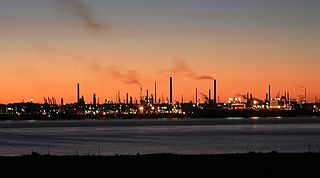
Petrochemicals are the chemical products obtained from petroleum by refining. Some chemical compounds made from petroleum are also obtained from other fossil fuels, such as coal or natural gas, or renewable sources such as maize, palm fruit or sugar cane.
NOVA Chemicals Corporation is a Canadian petrochemical company that has been in operation since 1954. NOVA was formed as provincial crown corporation called the Alberta Gas Trunk Line Company Limited to manage Alberta's natural gas collection system. During the 1970s, the company diversified into petroleum exploration and production, manufacturing, and petrochemicals. In 1980 the AGTL was renamed NOVA, An Alberta Corporation. After a decade of financial struggles, in 1998 NOVA sold its petroleum and pipeline business to TransCanada Pipelines and continued as solely a petrochemicals operation. The gas collection system run by TransCanada is now called the NOVA Gas Transmission Line.
Braskem is a Brazilian petrochemical company headquartered in São Paulo. The company is the largest petrochemical company in Latin America and has become a major player in the international petrochemical market.

Panipat Refinery is an oil refinery located in Baholi, Panipat, Haryana, India. It was set up in 1998. Panipat Refinery is the seventh refinery belonging to Indian Oil Corporation Limited. It is one of South Asia's largest integrated petrochemicals plants. Panipat Refinery meets the demand of petroleum products of Haryana and of the entire North-West Region including Punjab, J&K, Himachal, Chandigarh, Uttaranchal state and part of Rajasthan & Delhi. It stands by Indian Oil vision to become a major, diversified, transnational, integrated energy company, with national leadership and a strong environment conscience, playing national role in oil security and public distribution. Bedgsing younger of the Indian Oil refineries it houses latest refining technologies from Axens; France, Haldor-Topsoe; Denmark, UOP; USA, Stone & Webster; USA and Delta Hudson-Canada, Dupont, USA and ABB Luumas. The original cost of the refinery's construction was Rs 3868 Crores. It commenced with a capacity of 6 million tonnes per year and has been recently augmented to 12 million tonnes per year at a cost of Rs 4165 Crores. The refinery is designed to handle both indigenous and imported crudes. It receives crude through the Salaya Mathura Pipeline which also supplies crude to Mathura and Baroda refineries.

Shell Chemicals is the petrochemicals arm of Shell plc. The name "Shell Chemicals" refers to the nearly seventy companies engaged in chemicals businesses for Shell, which together make up one of the largest petrochemical producers in the world. The company has a wide range of products that include acetone, aromatics, ethylene oxide, ethylene glycols, alkenes, nonene, phenol, polyethylene, polyols, and solvents.
The National Oil Corporation is the national oil company of Libya. It dominates Libya's oil industry, along with a number of smaller subsidiaries, which combined account for around 70% the country's oil output. Of NOC's subsidiaries, the largest oil producer is the Waha Oil Company (WOC), followed by the Arabian Gulf Oil Company (Agoco), Zueitina Oil Company (ZOC), and Sirte Oil Company (SOC).

GAIL (India) Limited is a central public sector undertaking. It has the following business segments: natural gas, liquified natural gas, liquid hydrocarbon, liquefied petroleum gas transmission, petrochemicals, city gas distribution, renewable energy including solar & wind, exploration and production, GAILTEL and electricity generation. GAIL was given the Maharatna status on the 1 February 2013 by the Indian Government, a status which 11 other Public Sector Undertakings (PSUs) have.
Borealis AG is an Austrian chemical company and is the world's eighth largest producer of polyethylene (PE) and polypropylene (PP). It is headquartered in Vienna, Austria.
The Ras Lanuf Refinery is a topping and reforming oil refinery in Ras Lanuf, Libya. It is part of a larger petrochemical complex also consisting of an ethylene plant, a polyethylene plant, plant utilities, and Ra's Lanuf Harbor. Until 9 March 2009, the complex was operated by the RASCO, a subsidiary of the National Oil Corporation. The current operator is the Libyan Emirates Oil Refining Company.
Ras Lanuf is a Mediterranean town in northern Libya, on the Gulf of Sidra in Tripolitania. The town is also home to the Ra's Lanuf Refinery, completed in 1984, with a crude oil refining capacity of 220,000 bbl/d (35,000 m3/d). The oil refinery is operated by the Ra's Lanuf Oil & Gas Processing Company, a subsidiary of the state-owned National Oil Corporation. Additionally, the city houses the Ra's Lanuf petrochemical complex – a major oil terminal – and oil pipelines: the Amal–Ra's Lanuf, the Messla–Ra's Lanuf, and the Defa-Ra's Lanuf pipeline.
The Zawia Oil Refining Company (ARC) is a subsidiary of the National Oil Corporation (NOC), incorporated under Libyan Commercial Law since 1976. ARC operates the Zawia Refinery, which was built in 1974 by Snamprogetti, Italy. Zawia is currently the country's second largest oil refinery after the Ra's Lanuf Refinery. Primary products include naphtha, gasoline, kerosene, light vacuum gas oil (VGO), fuel oil, base lubricating oils, and asphalt.

Fawley Refinery is an oil refinery located at Fawley, Hampshire, England. The refinery is owned by Esso Petroleum Company Limited, a subsidiary of Exxon Mobil Corporation, which acquired the site in 1925. Situated on Southampton Water, it was rebuilt and extended in 1951 and is now the largest oil refinery in the United Kingdom, and one of the most complex refineries in Europe. With a capacity of 270,000 barrels (43,000 m3) per day, Fawley provides 20 per cent of the UK's refinery capacity. Over 2,500 people are employed at the site.
TransAsia Gas International LLC is an energy investment company based in Dubai, United Arab Emirates. It is a subsidiary of Al-Ghurair Group.
Hanwha TotalEnergies Petrochemical Co., Ltd., is a joint venture between Hanwha and TotalEnergies Both companies own a 50% partnership in the venture.

OQ, formerly known as Oman Oil Company, is an energy investment company headquartered in Muscat, Oman. It is a wholly owned subsidiary of the Government of Oman through the Oman Investment Authority.

PTT Global Chemical, also known as PTTGC, is a petrochemical company that specializes in synthesizing olefins and aromatics. It was founded in 2011 and is a subsidiary of PTT Public Company Limited.
Dragon Aromatics Company, or Tenglong Aromatic Hydrocarbon, is a Chinese chemical company on the coast of Fujian province, Southeast China, until 2018 owned and run by Taiwan’s Xianglu Group. Its plant in Gulei was constructed in 2009 and has been producing paraxylene and orthoxylene for polyester fiber and garment manufacturers since 2013. In April 2015, an oil spill caused a massive explosion and fire, which burnt for 4 days and led to the evacuation of 30,000 residents.
Barmer Refinery is an upcoming public sector refinery and petrochemical complex in the Pachpadra of Rajasthan, India. It is owned by HPCL Rajasthan Refinery Limited (HRRL), a joint venture between Hindustan Petroleum Corporation Limited and the Government of Rajasthan. This refinery will be connected with Jamnagar Refinery and Bathinda Refinery through Amritsar Jamnagar Expressway.
Brahmaputra Cracker and Polymer Limited is a public sector undertaking situated at Lepetkata, Dibrugarh City, Assam, India. Included in the Assam Accord as an Assam Gas Cracker Project, the construction of BCPL was launched by then Prime Minister Manmohan Singh on 9 April 2007 and it was inaugurated for production on 5 February 2016 by Prime Minister Narendra Modi.
Formosa Petrochemical Corporation is a Taiwanese energy company engaged in refining of crude oil, distribution of refined petroleum products, the production and sales of olefins, and the generation of electricity and steam. It was founded as a subsidiary of Formosa Plastics Group, and went public in 2003. It is headquartered in Mailiao Township, Yunlin County, in Taiwan.






